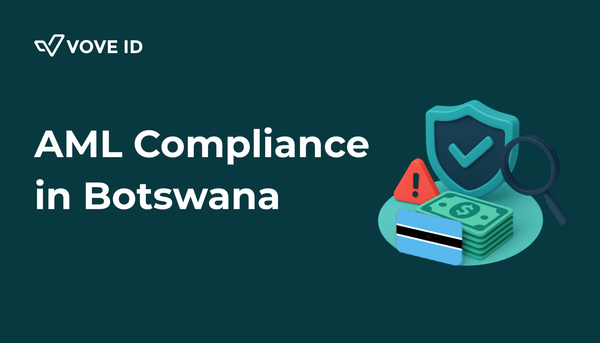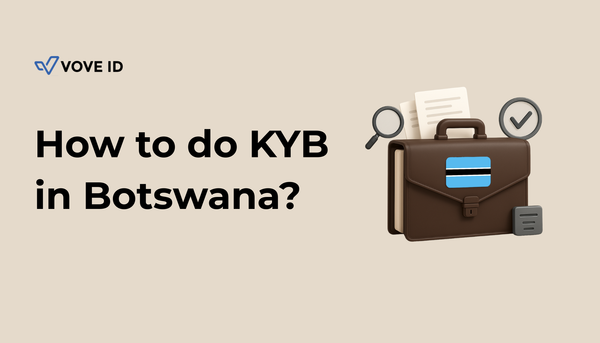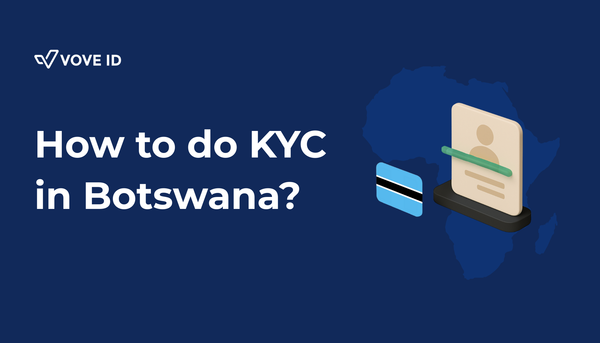AML Compliance in Senegal: 2025 Guide for Fintechs & Regulated Startups
AML, KYC, digital identity, and compliance in Senegal: 2025 guide for fintechs and startups to prevent money laundering efficiently.

Senegal’s fintech ecosystem is expanding rapidly, with digital wallets, BNPL platforms, micro-lending apps, and remittance services growing alongside increasing foreign direct investment. This growth brings heightened regulatory scrutiny, particularly around Anti-Money Laundering (AML) compliance.
For early-stage startups and fintechs operating in Senegal, robust AML compliance is essential for building trust, unlocking partnership opportunities, and scaling across the WAEMU region. Modern digital identity platforms like VOVE ID automate AML checks and maintain audit-ready compliance logs, making regulatory adherence faster, easier, and more reliable.
Senegal’s AML Regulatory Framework
Senegal has significantly strengthened its AML framework in recent years to align with FATF and GIABA standards:
- Law No. 2018-03 (23 February 2018): Establishes the primary framework to prevent money laundering and terrorist financing.
- Law No. 02/2024: Expands reporting obligations to fintechs, payment service providers, virtual asset service providers (VASPs), and real estate intermediaries. Introduces penalties for violations of up to XOF 500 million and prison terms for serious offenses.
- CENTIF: Senegal’s Financial Intelligence Unit (FIU) receives, analyzes, and disseminates suspicious transaction reports (STRs). In 2024, CENTIF processed over 1,200 STRs, underscoring increased oversight.
- BCEAO Directives: Mandate risk-based monitoring, annual AML training, and implementation of automated transaction monitoring systems.
- GIABA Membership and FATF Progress: As a GIABA member, Senegal was officially removed from the FATF grey list in October 2024, signaling improved compliance maturity.
These measures collectively form the foundation of KYC, KYB, and AML compliance, ensuring fintechs and startups operate transparently within Senegal’s financial system.
AML Compliance in Practice
Customer Due Diligence (CDD)
Fintechs must verify customer identities and assess risks. Key CDD measures include:
- Collection and verification of identity documents: National ID card (CNI), passport, driver’s license, or voter card.
- Screening against sanctions lists (UN, EU, OFAC, and local), PEP databases, and adverse media sources.
- Risk profiling: High-risk clients or cross-border users require Enhanced Due Diligence (EDD).
Transaction Monitoring
- Implement automated systems to detect unusual patterns or suspicious behavior.
- Maintain transaction logs and alerts for at least 10 years.
Reporting Obligations
- Submit STRs to CENTIF promptly upon identifying suspicious activity.
- Non-compliance risks significant fines, license revocation, and reputational damage.
Technology Integration
Platforms like VOVE ID streamline AML compliance by integrating identity verification, biometric authentication, sanctions screening, and automated risk scoring. Startups can minimize manual efforts while remaining fully audit-ready and aligned with local regulations.
Challenges for Fintechs
- High cash usage: Many transactions in Senegal remain cash-based, creating weak audit trails, which increases the importance of automated AML tools.
- Limited ID coverage in remote areas: Some customers lack chip-enabled CNIs, making digital verification solutions essential.
- Complex cross-border flows: Digital remittances and foreign-owned entities elevate AML risks.
- Resource constraints: Early-stage startups often lack dedicated compliance officers, making automation critical.
Opportunities and Trends
- Digital onboarding: Mobile wallets and eKYC solutions reduce friction while strengthening AML compliance.
- Biometrics and AI: Facial recognition, liveness detection, and AI-driven risk scoring improve monitoring accuracy.
- Cross-border growth: Enhanced regulatory clarity facilitates fintech expansion across WAEMU markets.
- Integration with VOVE ID: Embedding AML workflows into onboarding enables rapid screening of users and merchants, reducing risk without hindering growth.
VOVE ID: Enabling AML Compliance
VOVE ID empowers fintechs and digital businesses in Senegal to:
- Automate AML workflows and identity verification.
- Onboard users, merchants, and agents in minutes.
- Maintain secure, audit-ready logs aligned with Senegal’s evolving AML framework.
By integrating VOVE ID, AML compliance transforms from a bottleneck into a growth enabler.
Conclusion
AML compliance in Senegal is non-negotiable: a core pillar of responsible fintech operations. With robust regulatory frameworks, active supervision from CENTIF and BCEAO, and rising investor expectations, startups implementing strong AML measures from day one gain a clear competitive advantage.
Leveraging VOVE ID enables fintechs to automate checks, monitor risks, and scale confidently across Senegal and the WAEMU region.
Practical Insights
How long does AML verification typically take for a fintech user in Senegal?
With automated tools like VOVE ID, individual and merchant onboarding can take under 2 minutes on average, compared to several days with manual checks.
How often should fintechs update sanctions and PEP screening?
At least daily. Automated solutions maintain up-to-date global and local sanctions lists to reduce risk and regulatory exposure.
What percentage of users in remote or rural areas might lack chip-enabled IDs?
Roughly 15-20% of adults in rural Senegal may not have biometric CNIs, making biometric verification and OCR essential for full coverage.
How can startups optimize AML compliance with limited resources?
Outsourcing verification to RegTech platforms like VOVE ID, automating transaction monitoring, and integrating API-driven risk scoring reduces manual workload while maintaining audit-ready logs.
Are cash-intensive transactions a major concern?
Yes. Over 60% of daily transactions in Senegal still involve cash, so startups should combine digital onboarding with transaction monitoring and incentives to encourage traceable payments.
How can fintechs handle high-risk or cross-border clients efficiently?
Risk-based segmentation is key. High-risk or foreign clients should undergo enhanced due diligence (EDD) with automated monitoring and real-time alerts for suspicious activity.
Ready to simplify AML compliance in Senegal?
👉 Visit VOVE ID to explore how automated identity verification and transaction monitoring help fintechs stay compliant, reduce risk, and scale confidently across West Africa.




